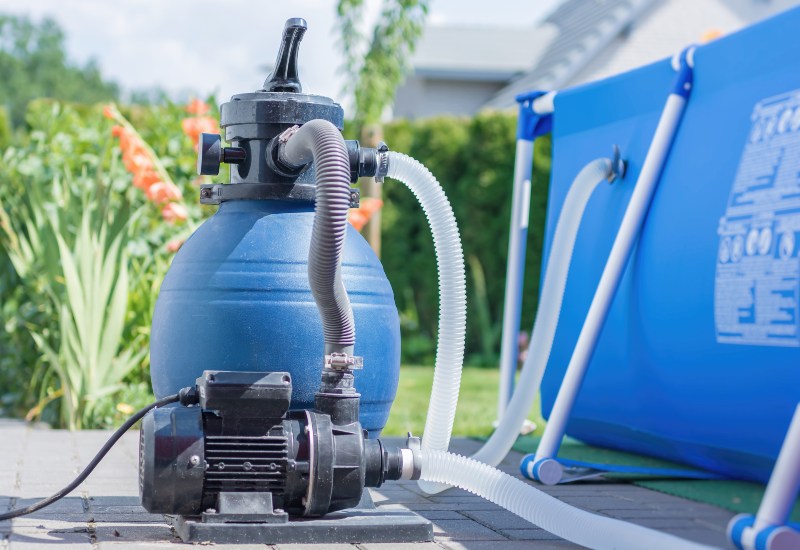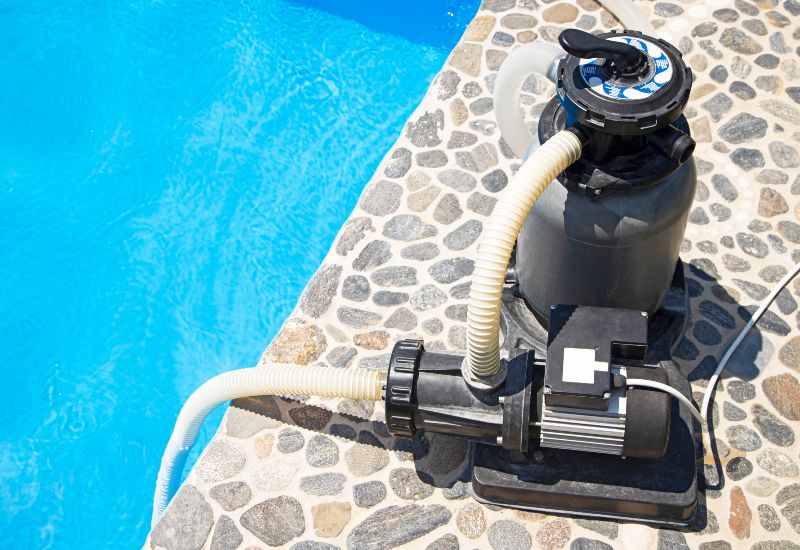Pool Sand Filter Replacement
Restore Crystal-Clear Water With Professional Sand Filter Replacement
A clean, sparkling pool starts with a well-maintained filtration system. Replacing an old or inefficient pool sand filter keeps water safe and clear. Millennium Pools & Spas specializes in pool sand filter replacement services, proudly serving Virginia, Washington DC, and Maryland. With years of experience and a commitment to excellence, we help local pool owners optimize their filtration systems for peak performance. If you’re dealing with cloudy water or looking to keep your pool in top condition, our expert team provides the reliable solutions you need.
What Is a Pool Sand Filter?
Pool Sand filters are essential to many residential and commercial swimming pools. It traps debris, dirt, and other unwanted particles as pool water passes through a specially selected filtration medium. This process ensures clean and safe water for swimmers while reducing the need for excessive chemical treatments. Choosing the right sand for your filter maintains its efficiency and extends its lifespan. Here is a detailed exploration of common pool filter sand types to help you make an informed decision:
- Silica Sand – This option is widely used due to its affordability and availability. Its granules are specifically graded to trap debris effectively while providing consistent filtration.
- Zeolite Sand – This natural volcanic mineral offers advanced filtration performance. Its unique structure allows it to capture contaminants as small as 5 microns, far exceeding traditional sand’s capabilities.
- Glass Sand – Crushed glass sand is an eco-conscious option that supports sustainability. Its non-porous surface reduces channeling, enhances filtration quality, and can last longer than silica sand.
- Polyester Balls – Although not sand, polyester balls are growing in popularity for their lightweight design and reusability. They ensure high-quality filtration while requiring less frequent replacement, making maintenance easier.
Signs It’s Time for a Pool Sand Filter Replacement
Recognizing the signs that your pool sand filter needs replacement maintains your pool’s cleanliness and efficiency. Over time, the sand in your filter degrades, becoming less capable of trapping debris and ensuring smooth water circulation. Addressing these issues quickly helps prolong the life of your pool equipment and keeps the water safe for everyone. Below is a list of common indicators that it’s time to consider pool filter sand replacement, along with a brief explanation for each:
- Cloudy Pool Water – The sand may no longer effectively filter out debris if your pool water remains cloudy despite regular maintenance. This reduces water clarity and can be a health risk.
- Reduced Water Flow – Weak or inconsistent water flow could indicate that aged sand is compacted, restricting circulation. This will make your pool equipment work harder, potentially leading to costly repairs.
- Visible Sand in Pool – When sand is found on the pool floor or in water returning through the jets, it suggests a filter malfunction. The sand particles are no longer contained, requiring immediate attention to your filter.
- Frequent Backwashing Needs – If you notice an increased need for backwashing, it typically means the sand is saturated with dirt and debris. This inefficient filtration makes maintaining a clean pool much more challenging.

Importance of Routine Pool Sand Replacement
Timely pool sand replacement improves the efficiency and hygiene of your pool’s filtration system. Over time, residential pool filter sand becomes worn and less effective at trapping debris, leading to cloudy water and increased chemical use. Regularly replacing your sand ensures optimal filtration performance while extending the lifespan of your pool’s equipment. Neglecting this simple maintenance task can result in higher upkeep costs and diminished swimming quality.
Millennium Pools & Spas Sand Filter Replacement Process
Replacing a sand filter is essential for maintaining clean and healthy pool water. Our pool sand filter replacement process restores efficiency while ensuring your pool stays clear and sparkling. The process is thorough, efficient, and handled by experienced professionals to give you peace of mind. Below, we outline the steps involved to help you understand how we keep your pool in top condition:
- Inspection and Preparation—Before we begin, we thoroughly inspect your pool filter system to identify any issues or damage. Then, we prepare the surrounding area to ensure a smooth and clean replacement process.
- Draining and Accessing the Filter – We carefully drain the pool filter and remove all necessary components to avoid unnecessary wear. This allows us to access the old sand without damaging your system.
- Sand Removal and Disposal – The old sand is removed using efficient tools to minimize mess and time. We properly dispose of the used sand in an eco-friendly manner.
- Adding New Sand – High-quality replacement sand is added to your filter in the correct amount to meet manufacturer guidelines. This ensures optimal performance and clean water filtration.
- Final Testing and System Restoration – Once the filter is reassembled, we test the system to guarantee proper function. After confirming everything is operating correctly, we will restore your pool to pristine and ready-to-use condition.

How Often Should The Sand Be Replaced in the Filter?
The frequency of sand replacement in a pool filter depends on several factors, including the size of the pool, filtration demands, and water quality. On average, sand should be replaced every five to seven years for residential pools. Heavily used pools, such as those in commercial environments, may require more frequent replacement to maintain optimal water clarity and filtration efficiency. Monitoring your filter’s performance and consulting experts can help determine how often to replace sand in a pool filter for the best results.
Maintenance Tips for Your Sand Filter
Proper pool sand filter maintenance ensures your system operates efficiently and lasts for years. A well-maintained sand filter prolongs the life of your pool equipment while providing crystal clear water. Regular care can prevent costly repairs and help maintain the overall health of your pool. Below are essential tips to keep your sand filter in excellent condition and support its long-term performance:
- Backwash Regularly – Backwash your sand filter when the pressure gauge reads 8-10 PSI above normal. This removes trapped debris and restores optimal water flow through the system.
- Inspect the Sand – Check the sand every 3-5 years and replace it if clumping or finished filtration is noticed.
- Monitor the Pressure Gauge—Monitor the pressure readings to detect early signs of clogs. Address rising pressure quickly by performing routine cleaning.
- Rinse After Backwashing – Always rinse the sand filter after each backwash cycle. This prevents leftover debris from re-entering the pool and reduces the strain on the system.
- Winterize Before Cold Months – Drain water from the filter and disconnect hoses to prevent freezing damage. Store equipment properly during winter for uninterrupted use in the next season.
Troubleshooting Common Sand Filter Issues
Troubleshooting a pool sand filter can save time and prevent costly repairs. Identifying and addressing common issues ensures your filtration system operates efficiently, keeping pool water clean and safe for use. Below is a list of strategies to troubleshoot frequently encountered sand filter problems effectively. Each addresses a specific symptom and provides practical steps for resolution:
- Cloudy Water – Check for improper settings on the multiport valve. If the settings are correct, examine the sand for clumping and cleaning or replace it.
- Leaks Around the Filter Tank – Inspect the O-ring on the filter’s valve. Replace it if cracked or worn to ensure a proper seal.
- Reduced Water Flow – Examine the pump basket and skimmer for clogs. Clean out any debris to restore normal water circulation.
- Excessive Sand in the Pool—Investigate lateral components inside the filter for breaks. Replace damaged parts to prevent sand from being discharged into the pool.
- High Filter Pressure—Backwash the filter to clear out accumulated debris. If pressure remains high, inspect the plumbing system for blockages.
The Pros and Cons of Pool Sand Filters
Sand filters are one of the most used filtration systems, valued for their simplicity and reliability. However, like any technology, they come with a distinct set of advantages and disadvantages that pool owners should carefully consider before making a choice. Understanding these factors can help determine whether a sand filter aligns with your pool maintenance needs and environmental conditions. Below, we explore the benefits and potential drawbacks of sand filters to provide a balanced perspective:
Advantages of a Pool Sand Filter
- Ease of Maintenance – Sand filters are simple to use and require minimal upkeep, making them an excellent choice for busy pool owners. They only need backwashing and occasional sand replacement, which can be done with basic tools.
- Durability – These filters are long-lasting and highly dependable, often performing efficiently for years with proper care. Pool owners typically experience fewer mechanical issues compared to other filtration systems.
- Cost-Effective—Sand filters are an affordable option for initial investments and maintenance. Their straightforward mechanics also mean fewer costly repairs or replacements.
Disadvantages of a Pool Sand Filter
- Limited Filtration Capability – Sand filters cannot catch extremely fine particles, which may leave some microscopic contaminants in the water. This could mean additional equipment is needed to achieve superior water clarity.
- Water Usage During Backwashing – The backwashing process requires significant amounts of water, which can increase costs and have an environmental impact over time. This issue is particularly relevant in areas with water restrictions.
- Bulky Design—Sand filters tend to be larger in size than other filters, requiring sufficient space for installation. For smaller pool areas, this can become a logistical challenge.
Why Choose Us?
Millennium Pools & Spas stands out as a trusted leader in pool maintenance and repair across Virginia, Washington DC, and Maryland. With over 15 years of expertise, we have built a reputation for reliability, precision, and customer-focused service. Every project we undertake meets the unique needs of our clients, whether residential pool services or commercial pool services. Our skilled team uses high-quality materials and cutting-edge techniques to deliver lasting results. We have locations in Springfield, VA, and Ijamsville, MD, to ensure fast and efficient service. Choosing our team means partnering with professionals dedicated to excellence and satisfaction.
Pool Sand Filter Replacement FAQs
Signs that your sand needs to be replaced include cloudy water despite proper chemical balance, reduced water flow through the system, or the filter requiring frequent backwashing.
Specialized pool filter sand, typically #20 silica sand with a specific particle size, is used for optimal filtration. This type of sand is specifically designed to trap contaminants, ensuring thorough water purification without the risk of clogging.
The sand should be replaced every 3-5 years, depending on the amount of use, pool size, and maintenance routines. Over time, the sand becomes worn and less effective at trapping debris.
Changing the sand is essential to maintain effective filtration. Over time, dirt, oils, and minerals coat the sand particles, diminishing their ability to trap impurities. Replacing the sand keeps your pool water clean, prevents strain on the filtration system, and extends the lifespan of your equipment.
Schedule Your Pool Sand Filter Replacement Today
Quality sand filter replacement requires professional expertise and attention to detail, ensuring years of reliable performance. Millennium Pools & Spas provides comprehensive sand filter services that keep your pool water crystal clear and safe for swimming. Our certified technicians use premium filter sand and proven installation techniques that deliver optimal filtration results and system longevity. Schedule your sand filter assessment today to maintain peak pool performance throughout the swimming season. Contact our professional team today to discuss your specific sand filter needs and receive your detailed service estimate.
Request an Estimate
Our estimates are free, professional and fair. Most estimates require a site visit. Response time will vary depending on the time of the year and the type of request.
